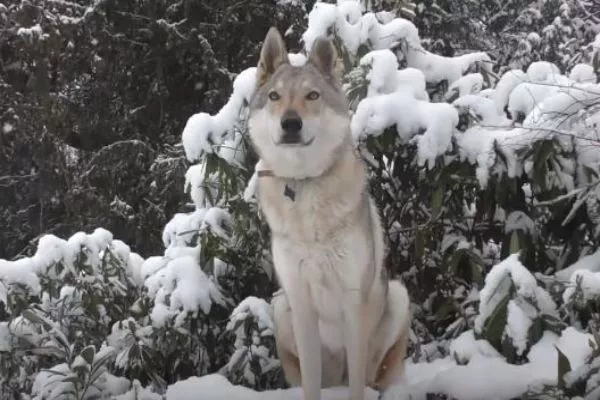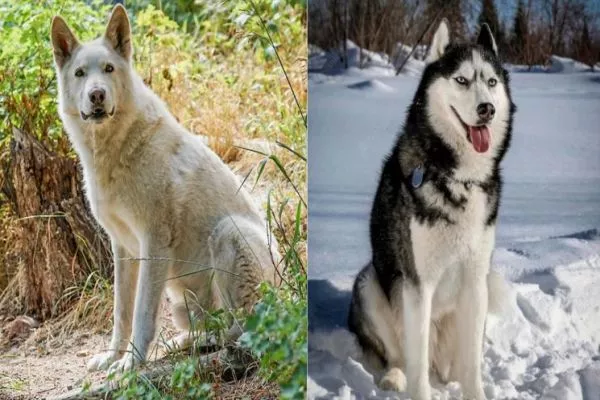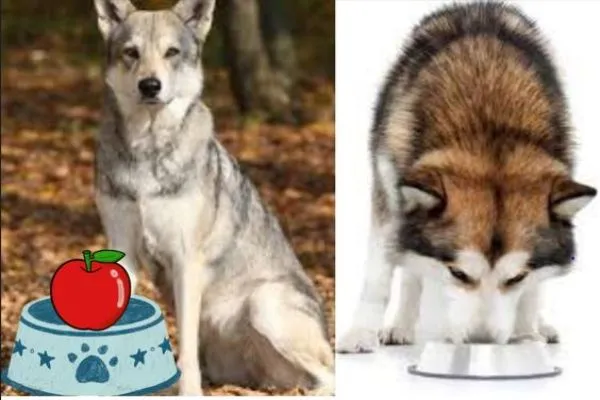Contents
- 1 Wolf Dog vs Husky: History and Origin
- 2 Wolf Dog vs Husky: Appearance
- 3 Wolf Dog vs Husky: Behaviour and Temperament
- 4 Wolf Dog vs Husky: Lifespan and Size
- 5 Wolf Dog vs Husky: Trainability
- 6 Wolf Dog vs Husky: Dietary Nutrition
- 7 Wolf Dog vs Husky: Bite force
- 8 Wolf Dog vs Husky: Price
- 9 FAQ
- 10 Final Thoughts
Are you considering getting a wolf dog or a husky? If so, it is important to know the differences between these two animals. Not only will it help you choose the right pet for your family, but it can also impact their overall quality of life.
In this article, we will explore the key differences between wolf dogs and huskies, such as their history and origin, appearance, behaviour and temperament, lifespan and size, trainability, etc.
Read on to learn more about these two majestic creatures!
Wolf Dog vs Husky: History and Origin
The furry origins of these two beloved breeds can be traced back centuries, and the stories they tell are as old as time.
Wolf Dog-

Wolf Dogs, or Wolf Hybrids, are dogs that have been bred with wolves. Wolf dogs have been around since ancient times and were initially bred for their strength, stamina, speed, and agility.
The goal was to create dogs that are loyal and easy to train like domestic dogs, but also physically strong and tough like wolves.
Throughout history, Wolf Dogs have been used for different purposes. In ancient times, they were used for hunting and herding livestock.
Their wolf-like qualities, such as agility, endurance, and sharp senses, made them great for these tasks.
However, because they have some wild traits from their wolf ancestors, they can be difficult to handle. They need owners who have experience and can meet their special needs.
Husky-

Huskies, on the other hand, originated in Siberia around one thousand years ago as sledge dogs bred and used by Chukuchi people to transport goods over vast distances.
Huskies were really important to the Chukchi people’s survival. They depended on these dogs for hunting, getting around, and keeping them company in their tough surroundings.
As time went on, Huskies became well-known for their ability to last a long time, their strength, and how well they could handle really cold weather.
Eventually, they were brought to other places like Alaska, where they were specifically trained as sledge dogs for racing and fun activities.
Also, Read- Best dogs under 5000 Rs in India
Wolf Dog vs Husky: Appearance
If you’ve ever seen a wolf-dog and a husky side-by-side, you know just how stark the contrast in their appearances can be!
Wolf dogs are much larger than huskies, They have thick fur coats, ranging from shades of grey to a variety of browns, with some having black or white markings.
Their ears stand tall on top of their head with pointed tips that give them an alert expression. Their eyes often display an intelligent gaze that hints at their wild ancestry.
Huskies come in many different colours including white, black and tan, as well as shades of red and grey.
Unlike wolf dogs where every individual looks slightly different due to their hybrid nature, huskies tend to have very similar facial features such as erect triangular ears and almond-shaped eyes which be blue or brown or each eye can have a different colour.
Also, Read- Can Huskies Survive in Delhi
Wolf Dog vs Husky: Behaviour and Temperament

You’ll observe a range of reactions when comparing the behaviour and temperament of Wolf Dogs and Huskies – from aloof independence to cuddly energy. While both breeds have their own unique personalities, there are some key differences in how they interact with humans:
- Wolf Dogs tend to be very independent and can show fear aggression towards strangers, whereas Huskies are known for their loyalty and affection towards people.
- Wolf Dogs may take longer to become comfortable around new environments or people, while Huskies adapt quickly.
- Wolf Dogs generally need more stimulation than Huskies, who can be content lounging around most of the day.
- When it comes to training, Wolf Dogs require much more patience and consistency as they often have shorter attention spans than Huskies.
- They both exhibit high prey drive but Wolf dogs show a very strong prey drive compared to a husky.
- It requires a very experienced owner to properly handle a wolf-dog on the other hand Siberian Huskies can be a great pet for the first-time owner(generally not recommended) if they are willing to put in the work to raise them.
Also, Read- Caucasian shepherd Dog Price in India
Wolf Dog vs Husky: Lifespan and Size
Comparing the lifespan and size of these two dogs, it’s clear that their physical attributes are as unique as their personalities.
Wolf Dogs tend to be larger than Huskies, reaching up to 34 inches in height and weighing between 70 to 100 pounds.
Huskies are more compact, usually topping out at 21-24 inches tall and 35-60 pounds in weight.
In terms of lifespan, a Wolf Dog typically lives 12-15 years while a Husky can expect 10-14 years.
Wolf Dog vs Husky: Trainability

Trainability is one of the key differences between Wolf Dogs and Huskies, with the former often requiring more patience and dedication to teach basic obedience commands.
To illustrate this point, consider a story about one wolf-dog owner who spent over a year working with her pup until he could reliably respond to her commands – an example of just how important it is to remain consistent when training a Wolf Dog.
Training a Wolf Dog requires not only consistency but also creativity in order to keep their attention while teaching them new behaviours.
One way to do this is by using positive reinforcement techniques such as clicker training or reward-based systems which can be very effective for taming stubborn wolf dogs without resorting to punishment or reprimands.
Wolf Dogs tend to be independent thinkers that are highly intelligent, but they may be more difficult to train due to their strong prey drive and desire for freedom.
If you’re looking for an obedient dog companion right away, then a husky may be the better choice as they tend to have an easier time picking up on commands compared to Wolf Dogs.
However, if you have the patience and commitment needed, many owners report that after some dedicated hard work and determination, their Wolf Dog eventually becomes just as obedient as any other breed of dog.
It’s important that owners properly socialize their wolf-dog from an early age so they can learn how to interact appropriately with humans and other animals in different environments.
This will help create boundaries so the pup understands what behaviour is acceptable and what isn’t while providing guidance in everyday situations like going on walks or meeting strangers at the park.
With enough patience, consistency, and dedication from its owner, even a wild wolf dog has the potential to become a well-behaved pet!
Also, Read- Best Dog Food in India
Wolf Dog vs Husky: Dietary Nutrition

When it comes to dietary nutrition, Wolf Dogs and Huskies are two very different breeds with distinct nutritional needs. Although both breeds require a diet that’s high in protein and fat, the quality of food matters more than anything else.
A balanced diet for a Wolf Dog or Husky should include:
- High-quality proteins such as chicken, beef, fish, and eggs
- Healthy fats from sources like salmon oil and coconut oil
- Nutrient-rich fruits and vegetables like broccoli, spinach, apples, and blueberries
The amount of food you feed your Wolf Dog will also depend on its activity level. Active dogs need more calories than less active ones while senior dogs may need fewer calories than puppies or adults.
It’s important to provide your Wolf Dog with enough food to maintain their energy levels but not too much that it could lead to weight gain or other health problems.
When feeding your Husky, it’s important to keep in mind that they have very high activity levels so they require more calories than other breeds do. Additionally, they have a strong appetite so it’s important to be careful not to overfeed them as this can cause obesity.
It’s essential for both Wolf Dogs and Huskies to get adequate amounts of nutrients from their diets in order to remain healthy and thrive for many years. Feeding these breeds the right type of food is key; providing them with high-quality proteins and healthy fats while avoiding processed foods is the best way to ensure that they’re receiving all the nutrition they need.
Also, Read- Best Dog Bed in India
Wolf Dog vs Husky: Bite force
You may be surprised to know that the bite force of a Wolf Dog and a Husky can vary significantly, so it’s important to understand the differences between them.
For example, a study found that an adult Wolf Dog was able to exert a bite force of up to 400 pounds per square inch (PSI) while an adult Husky can reach a maximum of 340 PSI. This means that the wolf-dog has as much stronger bite power as its husky counterpart! A wolf dog’s impressive jaw strength also allows them to easily crush bones and other hard objects without any difficulty.
The difference in their jaw strengths is due largely in part to their evolutionary history. Wolf dogs were bred for hunting larger prey which required them to have stronger jaws with higher PSI than their husky counterparts.
In contrast, huskies were bred for tasks such as sledging or pulling heavy loads where agility and speed were more advantageous than having high amounts of bite force.
As such, they evolved differently over time resulting in the disparities seen today between Wolf Dogs and Huskies when it comes to their biting power.
It’s important to note that not all Wolf Dogs are created equal when it comes to their bite force either – some breeds may exhibit greater jaw strength than others depending on how they were bred and trained.
Nevertheless, this information serves as an important reminder of why it’s essential for owners and potential adopters alike to research these animals thoroughly before making any decisions about bringing them home.
Also, Read- Belgian Malinois Dog Price in India
Wolf Dog vs Husky: Price

The cost of owning a Wolf Dog or Husky in India can be an important factor to consider, as the price tag may vary significantly depending on the breed and individual animal.
Before purchasing a wolf-dog make sure it has ll the legal papers and is KCI registered.
When it comes to owning a pure Wolf hybrid Dog, It can cost you between ₹10 Lakh to ₹15 Lakh in India.
On the other hand, Huskies tend to be much less expensive than Wolf Dogs, with prices typically ranging from ₹40,000-₹100,000 Rs. Prices of husky may vary depending on the quality, size, health and age of the husky.
FAQ
Are wolf dogs legal to have as pets?
The rules about owning wolf dogs as pets differ depending on where you live. It’s essential to look into your area’s laws and regulations before considering getting a wolf-dog as a pet.
Is it possible to fully domesticate wolf dogs?
Although wolf dogs have some genetic similarities to domesticated dogs, thoroughly domesticating them can be difficult.
This is because their behaviour and needs are influenced by a combination of wild and domestic instincts, which can make them more challenging to handle and train compared to regular dog breeds.
Do huskies make good family pets?
Yes, huskies can make good pets. As they are typically friendly and gentle in nature, making them generally good family pets.
However, it is essential to note that individual temperament can vary, and proper training and socialization are crucial for a well-behaved and happy husky.
Do wolf dogs and huskies have good compatibility with other pets?
Whether wolf dogs, huskies, and other pets get along can be influenced by several factors, such as their unique personalities, socialization experiences, and training.
While some wolf dogs and huskies may show friendly behaviour towards other pets, others might have a stronger instinct to chase prey or protect their territory.
It’s crucial to introduce them cautiously and in controlled situations to ensure compatibility and prevent any potential issues.
How much exercise is required for wolf dogs and huskies?
Both wolf dogs and huskies have lots of energy and need regular and active exercise to keep them healthy.
They enjoy activities like long walks, runs, hiking, or even agility training. It’s really important to give them enough exercise to make sure they stay happy and to prevent any destructive behaviour problems that could happen if they have too much energy built up.
Do wolf dogs and huskies shed excessively?
Both wolf dogs and huskies shed seasonally. However, During shedding seasons, which usually occur twice a year, they can shed heavily.
Final Thoughts
You’re standing at a crossroads, deciding between two roads. One path leads to a wolf-dog and the other to a husky.
Both animals have their own unique traits, from their appearance and behaviour to their dietary needs. While both are loyal companions, one may be better suited for your lifestyle than the other.
Which path will you take? Will you choose the strength of the wolf-dog or the carefree energy of the husky? The choice is yours!
Whatever decision you make, it’s important to remember that each animal comes with its own set of responsibilities and costs.
With careful research into their history, temperament, and nutrition needs – not to mention a bit of love – you can ensure that either canine companion will bring years of joy into your life.
Hope you found it helpful
Thank you for Reading.
